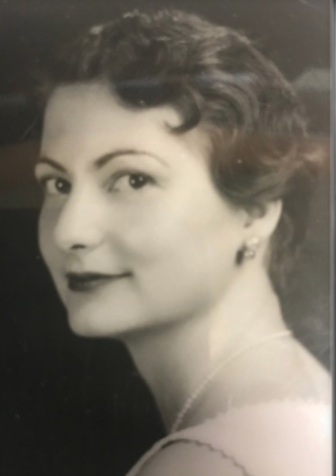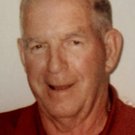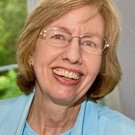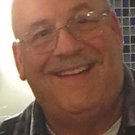Clara Joy Edgerton Freisatz
GUILDERLAND CENTER — Clara Joy Edgerton Freisatz, an independent woman who persisted through illness to care for her family, died on Saturday, Feb. 10, 2018. She was 86.
“She’s very down to earth,” said her daughter, Karen White. Mrs. Freitsatz was also resilient. She did not dwell on her hardships.
Born under the Zodiac sign of Aquarius, Mrs. Freisatz was someone who was intrigued rather than frightened by change, said her husband, Robert, and her daughter. She was very independent and liked to make her own decisions. People and their well being were important to her.
Joy Freitsatz was born on a Vermont dairy farm in 1932 in the midst of the Great Depression. Her mother, Clara B. Wilcox Edgerton, “was an outdoors lady who hunted and fished at a time when most women didn’t do that,” said Mr. Freitsatz.
Her father, James M. Edgerton, was a farmer who became a legislator. “He spoke up for people,” said Mrs. White. “His license plate was 107,” she said, a reference to the district he represented.
“They worked as a team,” said Mr. Freitsatz. “She was out on the tractor just like he was.”
Mrs. Friesatz was the middle of five children. The Edgertons’ farmhouse in West Arlington, Vermont — a simple two-story Federal building, white clapboard, with four windows downstairs in front, centered by a door, and five windows upstairs — was nearly identical to the one next door where Norman Rockwell lived.
“To us, it seemed he didn’t work very hard,” said Mrs. Freitsatz of the artist whom she didn’t know at the time was famous. She spoke to The Enterprise in 2008 about Norman Rockwell and his work, which filled her brick house in Guilderland Center.

Pages from a book by Joy Freisatz’s brother, James A. “Buddy” Edgerton, show, at right, Norman Rockwell’s 1945 “Thoughts on Peace on Lincoln’s Birthday,” depicting a wounded World War II soldier with an amputated leg, surrounded by vignettes showing the blessing of liberty Lincoln helped secure. On the left-hand page are pictures of Edgerton family members who served as models for the painting. Joy Freisatz’s daughter is pointing to a picture of her mother as a girl; she appears in the lower left corner of the painting along with her brother. Her praying mother and grandmother are to the right of the soldier, and her father is to the left of the soldier, reaching out to the hand of a black person at the bottom.
The Edgertons served as models for many of his paintings and were often called on to critique them. “He always wanted advice,” said Mrs. Freisatz. “He’d say, ‘You only have one chance to see a picture for the first time.’ He would ask, ‘How did that strike you?’ He sincerely wanted to know.”
The Edgerton family endured many hardships. They lost nearly all of their cattle twice — once to disease and a second time when the barn collapsed.
The hardest to bear though wasn’t financial loss. “My baby brother was born with spina bifida,” Mrs. Freisatz said. He went through two costly surgeries to close his brain and spine. But he died. A lot of bad things happened, but you go on. Vermonters are tough … This is what America is built on. I had ancestors that came over on the Mayflower. They had to survive that first winter.”
Mrs. Freisatz worked as a waitress and chambermaid to save money for college. Inspired by a neighbor, her husband said, she went to school in Rochester, New York and graduated from the Eastman Dental Hygiene program. “She went on to Oneonta State for a teaching certificate,” he said.
Certified as a dental hygiene teacher, Mrs. Freisatz worked in several school districts, coming to the Capital District to teach in East Greenbush.
She met the man who would become her husband at the First Reformed Church in Albany where both were members of a young-adults group. Mr. Freitsatz remembers noticing her at a bowling outing. “She was a pretty girl. She was from Vermont,” he said, noting that his mother was also from Vermont. “We kind of got along.”
The couple married on Oct. 12, 1957, a union that lasted 60 years, ending only with her death. Mr. Freisatz worked for General Electric in Schenectady and the couple first lived in a trailer in Schodack.
“After Karen was born,” said Mr. Freitsatz, “it was kind of crowded in the trailer,” which was just 8 feet wide and 36 feet long. The Freitsatzes moved to Guilderland Center, where they raised their son and daughter and lived ever since.
Mrs. Freitsatz decorated her home in a charming manner, filled with treasures including Norman Rockwell’s art.
“Joy liked birds,” said her husband. “She had a collection of ceramic birds. And she liked art. She had a lot of pictures by local artists. We had beautiful gardens. She loved flowers..” Her memorial service will include a poem her husband wrote for her about daisies.
Speaking about Mrs. Freisatz as a mother, her daughter said, “She cared about the well being of people. We were a package deal, the four of us … We made Christmas cookies —”
“And we made our own Christmas cards with a wood block stamp,” Mr. Freisatz chimed in.
Mrs. Freisatz persisted with homemaking despite having to battle several difficult health issues. “She had back surgery, which was a failure. It was the beginning of a long, long road,” said her husband.
“She was in a lot of pain,” said her daughter.
In the early 1980s, Mrs. Freisatz was diagnosed with Guillain-Barré syndrome, in which the body's immune system attacks part of the nervous system. “It just paralyzes you,” said her husband. “She stayed in St. Peter’s for six months to learn how to walk again and feed herself.”
Nevertheless, she persisted. She had learned that from her upbringing on the farm, said her husband. “They were tough,” said Mrs. White of her mother’s farm family.
Mrs. Freisatz’s father was the inspiration for one of Norman Rockwell’s most famous paintings, illustrating the freedom of speech, one of the four freedoms that President Franklin D. Roosevelt had said was the essence of American democracy and must be defended.
Mr. Rockwell wanted to paint the four freedoms but didn’t know how, Mrs. Freisatz said. In 1942, at an Arlington town meeting, after the high school in town had burned, her father spoke out against plans for building a new school.
“My father didn’t agree with what they were saying,” said Mrs. Freisatz. “He stood up and the others allowed him to speak ...When Mr. Rockwell went home, he said, ‘I know my next painting.’ He decided to paint “Freedom of Speech” — a man in work clothes, speaking out, while those sitting around him wear suits.
“They were working people,” said Mr. Freisatz of the Edgertons and their neighbors who shaped his wife in her childhood. “They didn’t have time or resources or energy to waste on fancy stuff. You did what was necessary to keep on going.”
“No matter what she did, she was always trying to make it smoother for the next person,” Mrs. White said of her mother. “After her diagnosis, she started a support group for GBS survivors … They used to visit people in the hospital, just to let them know —”
“You will survive,” Mr. Freitsatz completed his daughter’s thought.
Mrs. White went on, through tears, describing the lesson her mother taught. “It won’t be easy, but we’re living proof you can make it through this.”
When her husband was away on National Guard duty or traveling for his work at GE, Mrs. Freisatz would carry on, running their household, despite any medical challenges. “When she was on the farm, her father would give her a basket and tell her, ‘Go pick the potato bugs.’ You did it until you were done,” said Mr. Freisatz.
Mrs. Freisatz was always willing to help others, her daughter said. “If neighbors needed something, she was there.” She also volunteered for Community Caregivers when the program first started in the basement of St. John’s Church in Altamont.
After schools closed their dental hygiene programs, Mrs. Freitsatz started a second career, selling real estate. “It was one of the most wonderful things for her to match a buyer to the right house,” said her daughter.
“One of her first deals was a couple that rented an apartment in a big old house just up the road from us,” said her husband. “She helped them get a Farm Home mortgage so they bought a little house on the back road to Voorheesville.”
“She just loved helping people,” her daughter concluded.
****
Clara Joy Edgerton Freisatz is survived by her husband, Robert J. Freitsatz; her daughter, Karen White, and her husband, Mark; her son, Peter Freisatz; her brother, James A. Edgerton Sr,. and his wife, Dorothy; her sister, Ardis Clark; and four nieces, five nephews, and cousins.
Her parents, Clara B. Wilcox Edgerton and James M. Edgerton, died before her as did her sister, Edith Zindle; her brother, Harold Edgerton; her brothers-in-law, Stanley Zindle, Raymond Clark, and Paul Freisatz; her sister-in-law, Marion Freisatz; and aunts, uncles, and cousins.
A memorial service will be held on Saturday, Feb. 17, at the Helderberg Reformed Church at 435 Route 146 in Guilderland Center. A calling hour at the church, from 10 to 11 a.m., will precede the service.
Memorial contributions may be made to either the Helderberg Reformed Church, 435 Route 146, Guilderland Center, NY 12085 or to The Community Hospice, 310 South Manning Boulevard, Albany, NY 12208.
— Melissa Hale-Spencer



